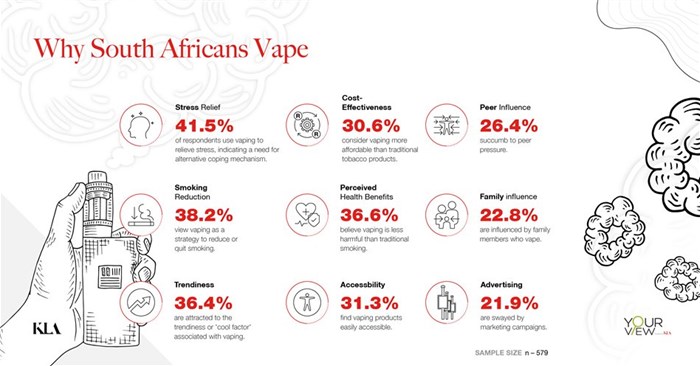Vaping has become a notable trend in South Africa, especially among the youth, prompting discussions among policymakers, health professionals, and the public. In South Africa, as in many countries, the trend has seen a significant upswing, particularly among the younger demographics, sparking considerable discussion among policymakers, health practitioners, and the general public.
As this trend gains momentum, our focus turns to examining why vaping is attractive to South Africans, particularly the youth, the current laws regulating its use, and the possible health effects. By looking into consumer insights using KLA’s YourView tool, we can better understand the vaping trend and its effects on society.
Why South Africans vape
A recent KLA YourView poll shed light on the motivations behind vaping:
Stress relief - 41.5% of respondents use vaping to relieve stress, indicating a need for alternative coping mechanism
Smoking reduction - 38.2% view vaping as a strategy to reduce or quit smoking.
Perceived health benefits - 36.6% believe vaping is less harmful than traditional smoking.
Trendiness - 36.4% are attracted to the trendiness or 'cool factor' associated with vaping.
Accessibility - 31.3% find vaping products easily accessible.
Cost-effectiveness - 30.6% consider vaping more affordable than traditional tobacco products.
Peer influence - 26.4% succumb to peer pressure.
Family influence - 22.8% are influenced by family members who vape.
Advertising - 21.9% are swayed by marketing campaigns.
Youth and vaping
A recent study conducted by the University of Cape Town Lung Institute highlights a concerning trend: a significant number of South African learners are now vaping, with almost 7,000 reported cases. The study shows a discordant pattern across different school grades, with 26.5% of the learners in Grade 12 admitting to vaping. The percentages decline slightly in lower grades, reporting 17.4% in Grade 11, 13% in Grade 10, and 10.8% in Grade 9. These statistics point towards a growing inclination among the youth towards vaping, raising alarms about its potential health implications and the necessity for parental vigilance.
The stress-vaping connection in kids
The study by the University of Cape Town Lung Institute revealed that stress is a key driver behind the rising trend of vaping among affluent South African youth. This highlights the role of stress, peer influence, and perceived societal acceptance in encouraging vaping among teenagers.
Key findings suggest that despite being from well-resourced backgrounds, these teenagers are turning to vaping as a misguided stress relief mechanism. Confirming this, our poll found that 41% of participants, including adults and youth, vape primarily to alleviate stress.
Additionally, sociocultural pressures, including peer acceptance and parental attitudes, further compound the issue. Some parents are even providing vaping devices to their children, mistakenly believing it to be a safer alternative to smoking or drug use.
The study spotlighted the need for stricter regulations on the sale and marketing of vaping products and emphasised the importance of educational campaigns to clear up myths around vaping. Addressing these factors is essential for curbing the growing trend of vaping among South Africa’s youth.
Vaping in schools: Policies and impacts
South Africa's new vaping tax, intended to decrease vaping product demand, has sparked a debate among school authorities, parents, and students. The tax is critiqued for not effectively targeting young vape users, especially considering that many vaping products, like disposable vapes, appeal directly to youth.
Vaping in schools presents an ongoing issue, and items are marketed in flashy designs and flavours to attract young users. Despite age restrictions on sales, minors frequently obtain these products.
Views on vaping differ among stakeholders – school authorities balancing enforcing rules and accessibility of vapes, parents with varying awareness levels about vaping's risks, and students who might see vaping as stress-relief or rebellion.
To curb vaping effectively, a comprehensive approach encompassing policy enforcement, education, and intervention is needed. As vaping continues to gain popularity, it's crucial to address its implications and develop strategies to mitigate its impact, particularly among the youth. For more information, visit www.kla.co.za



























![Today, Halo and Demographica announce a new specialist agency, Second Rodeo]], headed up by Mike Stopforth (left). Dean Oelschig, managing partner and founder of Halo (right) says they will work as a group but ultimately, each agency will be an individual specialist](https://biz-file.com/c/2505/772543-64x64.jpg?2)



